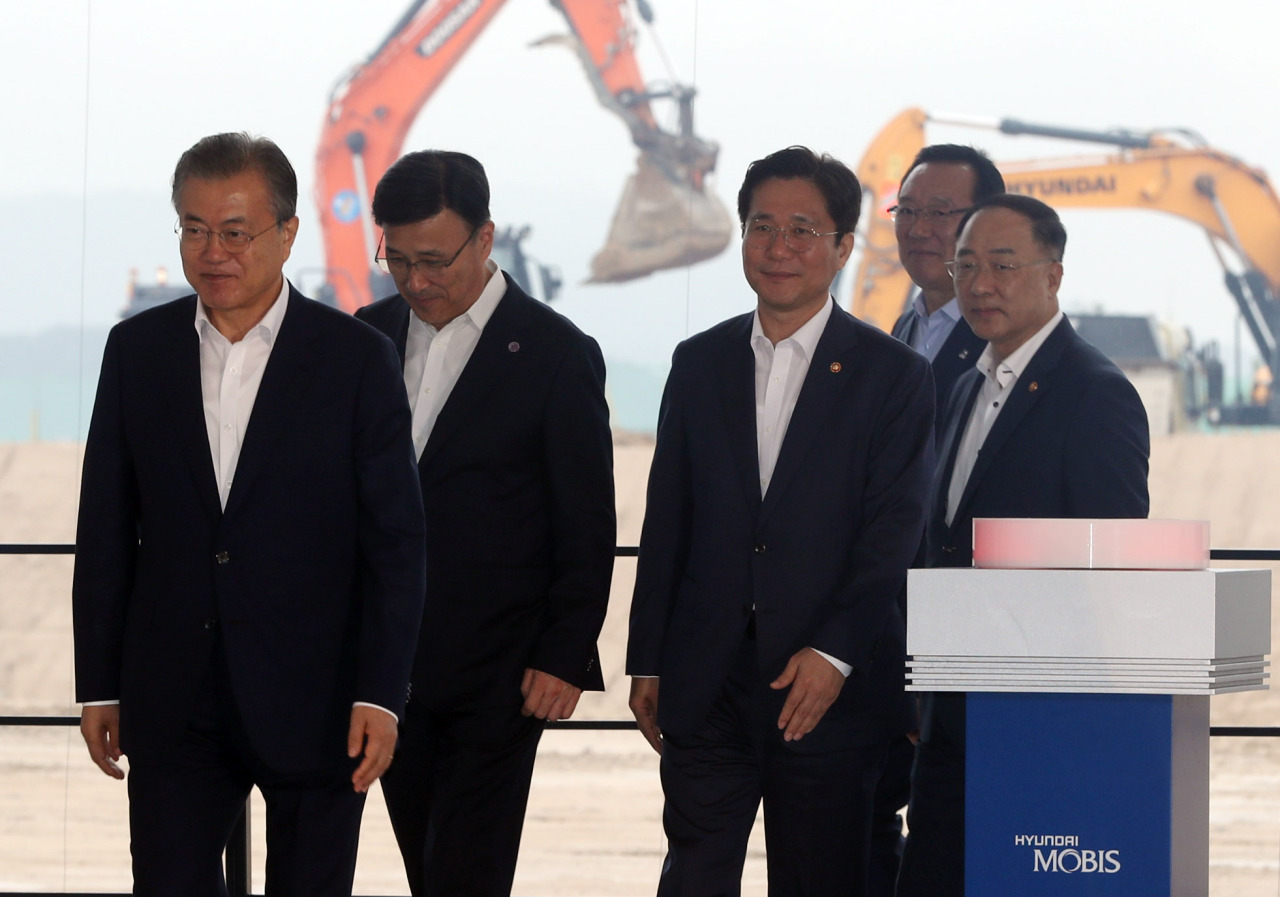Making a U-turn, Hyundai Mobis to build new EV parts plant in Ulsan
Auto parts maker returns home after reportedly cutting back production in China, Moon hails Mobis decision, green car technology
By Cho Chung-unPublished : Aug. 28, 2019 - 15:20
Marking the first case of a Korean conglomerate bringing its overseas manufacturing facility back home, Hyundai Mobis said Wednesday it will build a new plant to produce electric vehicle components in Ulsan, injecting 300 billion won ($247 million) in fresh investments.
The new plant will be capable of producing core EV parts for 100,000 vehicles a year, with its operation starting in 2021, the company said.
The auto parts maker’s decision of making a “U-turn” investment raises hopes for the South Korean economy, President Moon Jae-in said as he attended the plant’s groundbreaking ceremony. Since 2013, the government has been offering tax incentives and other benefits to businesses moving their facilities back home. Mobis is the first in the group of large conglomerates to invest back home after years of relocating its production facilities overseas.
The new plant will be capable of producing core EV parts for 100,000 vehicles a year, with its operation starting in 2021, the company said.
The auto parts maker’s decision of making a “U-turn” investment raises hopes for the South Korean economy, President Moon Jae-in said as he attended the plant’s groundbreaking ceremony. Since 2013, the government has been offering tax incentives and other benefits to businesses moving their facilities back home. Mobis is the first in the group of large conglomerates to invest back home after years of relocating its production facilities overseas.

“We cannot help but protect ourselves at a time when free and fair trade system is tottering and when retaliatory trade (restriction are being pushed for) with political motives,” Moon said.
“At this difficult time, prospective companies returning home gives hope to our economy. The government will not spare support for businesses making investment back at home.”
Moon was attending the event alongside Finance Minister Hong Nam-ki, Trade Minister Sung Yun-mo and Hyundai Mobis CEO Park Chung-kook.
His comment on turning Korea into a manufacturing powerhouse was made just as Tokyo’s decision to remove Seoul from its trade whitelist took effect.
In an apparent effort to lift confidence among businesses, Moon also hailed Mobis’ green car technology and said its new plant in Ulsan will pave the way for the city to become a leading hydrogen economy. Ulsan, where Hyundai Motor and its subsidiaries have held a strong manufacturing foothold for decades, plans to have 67,000 vehicles powered by hydrogen by 2030. In the same year, Hyundai, a leader in hydrogen technology, plans to secure production capacity of half a million FCEVs annually.
Mobis’ new plant is a part of Hyundai Motor Group’s green car strategy. The carmaker is expected to unveil a new platform to be used both for electric and hydrogen-powered vehicles next year, with its auto parts making unit Mobis supplying core parts. Mobis declined to name the country from which it was returning home, citing the importance of maintaining business ties with overseas clients. Industry insiders have suggested that the auto parts maker is probably returning home after scaling its business back in China.
The 300 billion-won project is also a part of Mobis’ three-year plan to invest 4 trillion won to secure leadership in future mobility technologies.
It already has manufacturing facility in Chungju, North Chungcheong Province, capable of producing parts for 400,000 electrified cars a year.
The investment is being made as the company expects to see record-high demand this year for electrified car parts. It sold electric vehicle parts valued at 1.8 trillion won last year from 1 trillion won in 2017.
The market size for eco-friendly cars is expected to expand to 20 million in 2024 from 6 million this year, according to IHS Markit. The number of pure electric cars will account for a half of the market in the next five years, it added.
By Cho Chung-un (christory@heraldcorp.com)









![[Today’s K-pop] BTS pop-up event to come to Seoul](http://res.heraldm.com/phpwas/restmb_idxmake.php?idx=644&simg=/content/image/2024/04/17/20240417050734_0.jpg&u=)
![[Graphic News] More Koreans say they plan long-distance trips this year](http://res.heraldm.com/phpwas/restmb_idxmake.php?idx=644&simg=/content/image/2024/04/17/20240417050828_0.gif&u=)






![[KH Explains] Hyundai's full hybrid edge to pay off amid slow transition to pure EVs](http://res.heraldm.com/phpwas/restmb_idxmake.php?idx=652&simg=/content/image/2024/04/18/20240418050645_0.jpg&u=20240419100350)

